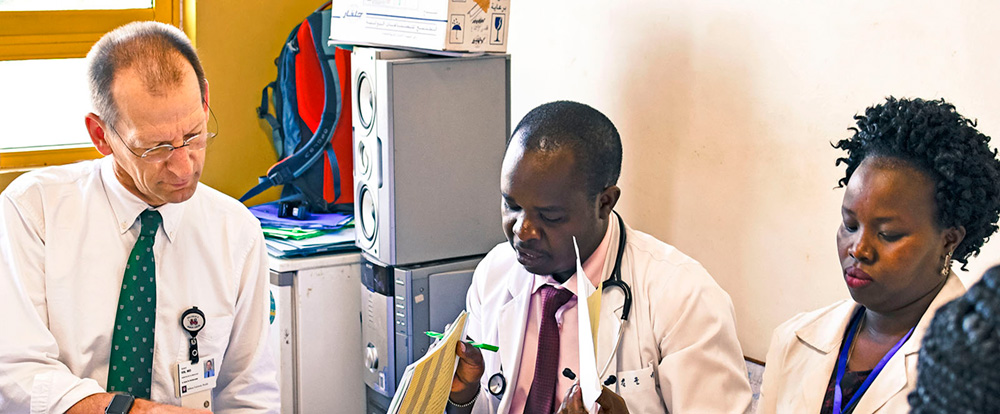Child Receives Life-Saving Treatment Through the ECHO Network
Without Project ECHO’s support, *Tyler’s story would have a tragic ending.
The young boy from Kenya would have died from Burkitt lymphoma – a fast-growing cancer – if an ECHO team hadn’t been mentoring providers in the area.
“He would’ve been one of the 1,500 or 2,000 kids we never hear about,” said Dr. Terry Vik, professor of clinical pediatrics at the Indiana University School of Medicine and founder of a pediatric oncology ECHO in Kenya.
Vik has been treating children with cancer and blood diseases for 35 years. He’s seen thousands of children in Indiana and Kenya, where he’s worked roughly a decade.
He has found that many cancer diagnoses are missed in Kenya because local providers aren’t aware of the diseases or how to treat them.
“You never realize how many roadblocks there are to accessing care in Kenya,” Vik said.
The country has moved away from centralization to a county-by-county system with a hospital in each county for local residents. This decentralization resulted in a critical need to connect county hospitals to specialty medical centers and experts. Project ECHO, a virtual mentoring and learning community for local providers in rural and underserved areas, is that life-saving connection.
Vik said the ECHO model is “the perfect way” to reach out to health care workers quickly and consistently to get pediatric cancers and treatments on their radar.
“Instead of taking a week or more, we can cut the time to make a diagnosis down to less than a day,” Vik said.
Tyler was connected to life-saving care through a video call with the Academic Model Providing Access to Healthcare (AMPATH) Pediatric Oncology team. Using Project ECHO’s model, health care professionals in Kenya ask questions, share knowledge and talk through tough cases.
Kericho County Hospital told the ECHO team about the child’s sudden abdominal swelling and rapidly worsening condition. Local doctors weren’t sure of the cause, but the team recognized the warning signs of Burkitt lymphoma.
“Burkitt lymphoma is the ‘poster child’ for cancer in sub-Saharan Africa,” Vik said. “It’s been studied for 40 or 50 years. There’s a lot of interest in it, because it’s a cancer that develops where malaria is prevalent. We believe that malaria weakens immune response, making those who are infected more susceptible to the cancer.”
The immediate diagnosis saved Tyler’s life.
“Within days, he received treatment that would have otherwise come too late,” Vik said.
An accurate diagnosis is the first, crucial step toward successful treatment. Since the AMPATH program launched, the number of children diagnosed in Kenya by program participants has increased from 85 annually to upwards of 300.
Project ECHO is making strides in the fight for better cancer care around the world thanks to the generous support of our funders.
“Without the support of the Bristol Myers Squibb Foundation, our Cancer ECHO Initiative wouldn’t be as successful as it is today,” said Lucca Cirolia, senior program manager for the initiative. “The foundation’s support has been instrumental to our work, which has grown to more than 150 programs in 14 countries.”
*Tyler is a fictional name to protect the identity of the patient.


